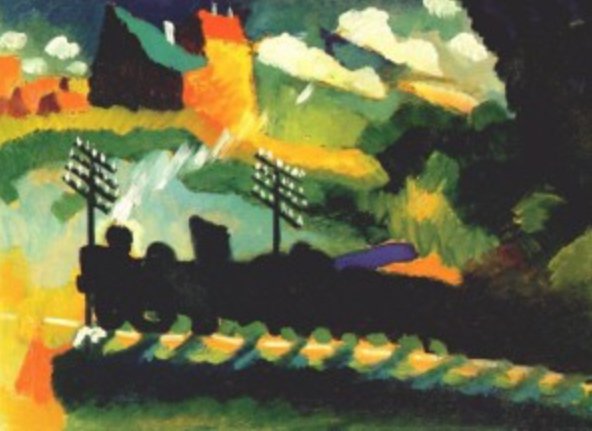Stopping the Trauma Train I
Murnau train et château by Vassily Kandinsky, 1909
It took me decades to understand my family's tragedies: a brother's suicide, a sister's psychosis, the callous cutting of ties between parents and siblings, between siblings and each other. What made us so volatile, so unloving?
I had no idea that my family's intensity had anything to do with a trauma response, that the aggression and force that my parents employed were—at least in part—a clumsy cover to the fear and dread of annihilation that lay at their core. The puzzle I inherited was far from obscure. I had only to decipher the clues.
My father was a born-again Jew from Brooklyn serving in the U.S. Army Air Corps when he met my Orthodox refugee mother. Young and wide-eyed, Kate had just made her way out of Germany on the Kindertransport. Soon after arriving to the US, still faltering in a new language, she met Sol—handsome, mustached and in uniform. They married shortly thereafter.
Dad died at 65. It was only upon reading his obituary that I learned he had taken part in the liberation of the Buchenwald Concentration Camp in 1945. Hidden away in his files were the shocking photographs he had taken of atrocities he had witnessed: the vermin-infested conditions of the barracks, decaying corpses, abandoned Nazi warplanes.
While these lethal images had been concealed from us and from conscious conversation, the emotional impact of his experience never left him and it flowed into us. Unprocessed trauma emits its own brand of poison. Even without pictures, facts, or explanations, the charge behind traumatic experiences transmits itself.
I held and beheld Dad's vile pictures and I understood more about the high-voltage he carried inside himself all those years. The sepia images of ravaged human corpses and the squalid conditions of their enslavement horrified me. Yet they were also strangely familiar. Long before I ever laid my physical eyes on them, I had picked them up in the shared ethers of my family's post-Holocaust Jewish world.
And I began to realize that what had unfolded in my siblings' lives and in my own was no accident.
I have come to understand how a family's trauma experience rumbles through history like a train, depositing its load, car after car into newborn skin. We are carriers of our ancestors' legacies. Parts are upright and positive. Parts are shot through with panic, rage, and stark terror. We inherit trauma both environmentally and organically. Most of us are unconscious of our inheritance. But at any moment, we can wake up and stop the trauma train.

